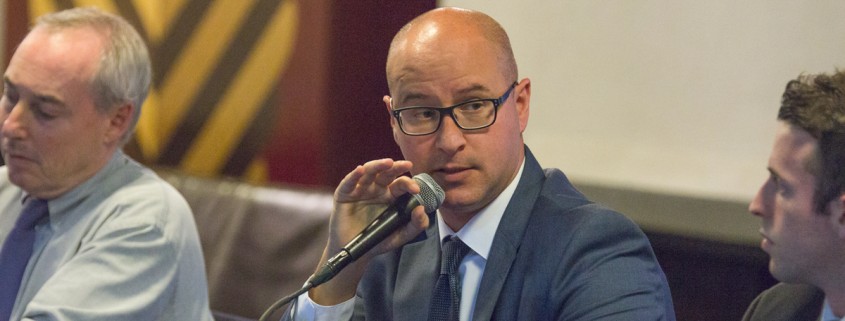Trojans for Israel examines US-Middle East relations
Trojans for Israel hosted a panel with USC Undergraduate Student Government leaders and political experts to discuss the United States’ foreign policy in the Middle East in relation to Israel during a leadership dinner at USC Hillel Wednesday.
The panelists included Dan Schnur, director of the Jesse M. Unruh Institute of Politics, Yaki Lopez, consul for political affairs at the Consulate General of Israel in Los Angeles, Alec White, a member of the College Democrats, and Aaron Rifkind, a member of the College Republicans.
Audience members asked panelists about an array of subjects, including the relationship between the U.S. and Israeli governments, the handling of the refugee crisis in Syria and the Israeli-Palestinian conflict. President of TFI and moderator Samantha Viterbi said that she was pleased that the oftentimes-contrasting political opinions and agendas of the panelists offered a multitude of beliefs and possible solutions.
“I enjoyed that we brought four people to the panel tonight because I thought that there were a lot of different perspectives shown,” Viterbi said. “I was excited to hear the different thoughts from the College Democrats and College Republicans.”
Schnur and Lopez believed that the United States has played a dramatic role in shaping the geopolitical landscape of the Middle East since the end of the World War II. They stressed that the U.S. must continue to offer financial and military support in order to help stabilize this largely volatile region in the world.
The night was filled with many attempts at finding solutions for Israel’s international political affairs. Lopez hinted that, with the new agreement with the United States, which allows Iran greater nuclear capacities, there has been a greater dialogue between Israel and the Sunni countries in the region. He believes that a coalition between Middle Eastern states will inspire a greater effort in their combined fight against ISIL, and can additionally contribute to stabilizing the relationship between Israel and Palestine.
Lopez said the United States should set a precedent to the rest of the world that they are willing to support countries that share its beliefs in human rights, and that the government of Israel would similarly support a two-state solution to the Israeli-Palestinian conflict, if the Palestinian government demonstrates that it is willing to comply with such human rights conditions.
“Israel supports a two-state solution. We would like to see a viable Palestinian state,” Lopez said. “The only way we are going to achieve that is by talking face-to-face.”
Schnur gave an example of his own Jewish grandparents, who faced xenophobic sentiment when they emigrated to the United States from Eastern Europe to escape persecution by Nazi Germany, as a reminder to the audience of the humanitarian responsibility the United States has to rest of the world.
Schnur disagreed with the idea that Syrian refugees could bring terrorism. Schnur said that while his grandparents were labeled as spies for Germany, without the support of the U.S. government, neither he nor many Jewish families would be there tonight. As a result, Schnur said that the United States should “set the tone,” and be far more active in the resettlement process of Syrian refugees.
“A lesson to learn in the Syrian refugee crisis is to set an example for the rest of the world,” Schnur said. “We will lack the moral stature to go to other countries and ask them to bear their share of the burden if we are not in the front lines helping too.”

